Underestimating such people can put you in danger.
Written by: Noah Smith
Translated by: Block unicorn
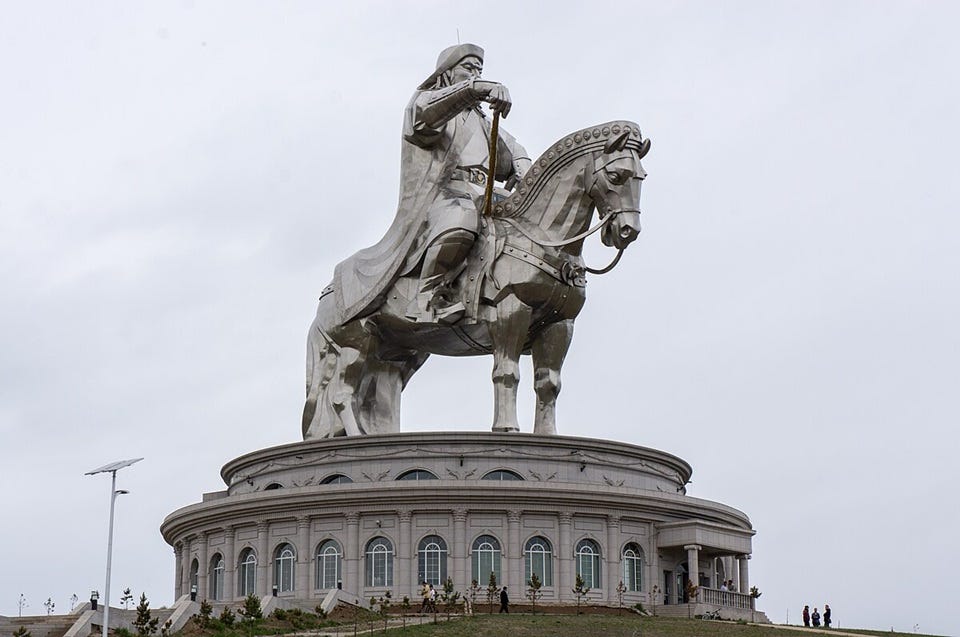
I am currently writing a longer article, but after two days, I still haven't finished it. In the meantime, I want to share a rather absurd statement I recently came across: "Elon Musk is not smart. His IQ might be around 100, or even lower. The only reason he has achieved what he has today is that he was born into a wealthy family and had great luck."
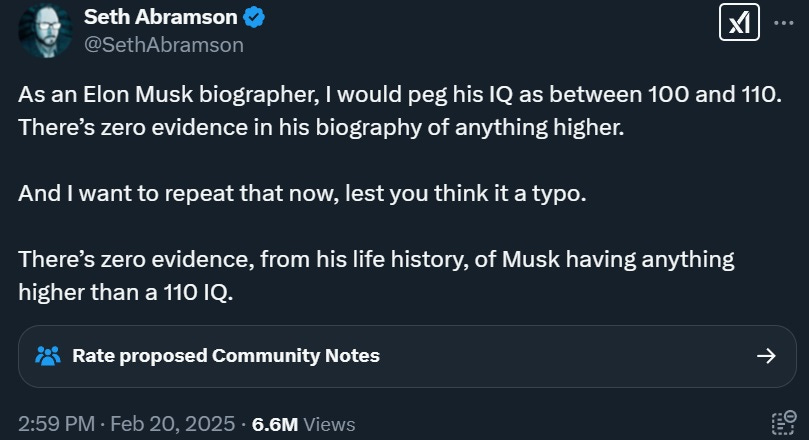
Of course, this statement is incorrect. According to biographer Walter Isaacson, Musk scored 1400 on the SAT when he took it for the second time in the late 1980s. SAT scores are highly correlated with IQ, and based on all the information I found, a score of 1400 at that time corresponds to an IQ of around 130. Additionally, Musk holds a bachelor's degree in physics and was accepted into a materials science PhD program in the 1990s. His intellectual level is far above average.
However, the absurdity of Abramson's statement lies not in its content, but in its purpose—he attempts to diminish the fear that American society has towards Musk and his role in American politics by belittling his IQ. This approach is very foolish.
First of all, IQ is not an effective measure of Musk's abilities in areas where he excels, such as organizing and improving businesses, identifying talent, managing large teams, raising funds, and creating and communicating future visions. Research by Keuschnigg et al. (The Flattening of Cognitive Ability Among High Earners, 2023) found that the role of IQ tends to flatten out once wealth reaches a high level:
"We analyzed registration data from Sweden, which included cognitive abilities and labor market performance of 59,000 men who took mandatory military service tests. Surprisingly, we found that while the overall relationship between ability and salary is strong, after annual income exceeds 60,000 euros, the role of ability flattens out, only one standard deviation above the average. The cognitive abilities of the top 1% earners are even slightly lower than those of people with slightly lower incomes."
In the past, Americans placed great value on abilities that cannot be measured by tests—real-world business acumen is often more respected than book knowledge. However, as the importance of the knowledge industry has increased and the power and status of the educated professional class have risen, American society has begun to worship pure intelligence. Even those Americans who would insist that IQ is a racist and meaningless concept when pressed will thoughtlessly call others "idiots" or discuss their low IQs in social media debates.
However, regardless of Musk's IQ, he has undoubtedly accomplished incredible feats of organizational building throughout his career. Here is a passage from a post I wrote about Musk last October, where I described entrepreneurship as a superpower:
"Despite the hollowing out of American manufacturing (as well as manufacturing in countries like Germany and Japan) due to competition from China, our great old companies are struggling and declining, yet one entrepreneur has been able to establish and scale a massive, cutting-edge high-tech manufacturing company in the U.S. that is leading globally. That person is Elon Musk."
Take SpaceX as an example. Without Musk's company, the U.S. would be far behind China in the space race. But with SpaceX, the U.S. is far ahead of China… and SpaceX is a manufacturing giant. Although almost all manufacturing is done in the U.S., the company has been able to surpass the entire Chinese manufacturing industry in its field… SpaceX has launched so many Starlink communication satellites into low Earth orbit that Musk's satellite constellation now exceeds the total number of all other active satellites and spacecraft combined…
Other entrepreneurs have attempted to enter the space sector. Jeff Bezos, founder of the world's top e-commerce site and cloud computing network, founded Blue Origin, a company that competes with SpaceX, but it is far behind…
But SpaceX is neither a fluke nor an exception. Despite recent competition, Tesla still completely dominates the U.S. electric vehicle market… and when Musk recently established a cluster of GPUs to train his new AI models, its speed far exceeded what Nvidia CEO Jensen Huang thought possible.
As an entrepreneur, Musk is unmatched in American history—his closest competitor, Henry Ford, also failed in the aerospace industry.
Seth Abramson could not establish SpaceX, Tesla, or anything Musk has built, no matter how much others paid him. Dear reader, I couldn't do it, and you couldn't either. I believe that even Terence Tao or other super-genius mathematicians with the highest IQs on Earth couldn't do it either. Any of us, even if we spent a lifetime and burned a trillion dollars, might not be able to create anything close to Musk's achievements in high-tech industrial giants.
Why would we fail? Even without any institutional barriers, we cannot identify the best managers and engineers. Even if we find them, we often cannot persuade them to work for us—even if they come, we may not be able to motivate them to give their all every week. We also often fail to promote the best employees, empower them with more authority and responsibility, or decisively fire underperformers. We cannot raise hundreds of billions of dollars to fund the company at favorable rates. We cannot negotiate government contracts and generate buzz for consumer products. And so on.
Moreover, Musk may have done many less obvious things that we cannot do:
Marc Andreessen stated that a key driver of Musk's success is his obsession with quickly solving problems, and he often works directly with engineers or programmers who are facing difficulties… This legendary venture capitalist shared insights from his close collaboration with Musk at X, xAI, and SpaceX… Unlike many CEOs, Musk is committed to understanding every detail of his business, said the co-founder and general partner of A16Z. He "dives into the front lines, talks directly with the people doing the specific work," and acts as the "chief problem solver in the organization."
For over a decade, I have been observing how Musk successfully builds seemingly impossible companies and pushes them to new heights of success. And each time, there are mockers on social media calling him an idiot, a fraud, and a charlatan, claiming that his companies are on the verge of collapse and failure. Although Musk has not fulfilled every promise he has ever made, he has repeatedly made those mockers eat their words.
Moreover, Musk achieved these accomplishments in the face of an entire system of proceduralism and anti-development policies in the U.S. It is well known that building factories in the U.S. is very difficult, due to reasons including land acquisition costs, procedural barriers like NEPA, regulations, high labor costs, and so on. However, as of 2023, Tesla produces more cars in the U.S. than in China:
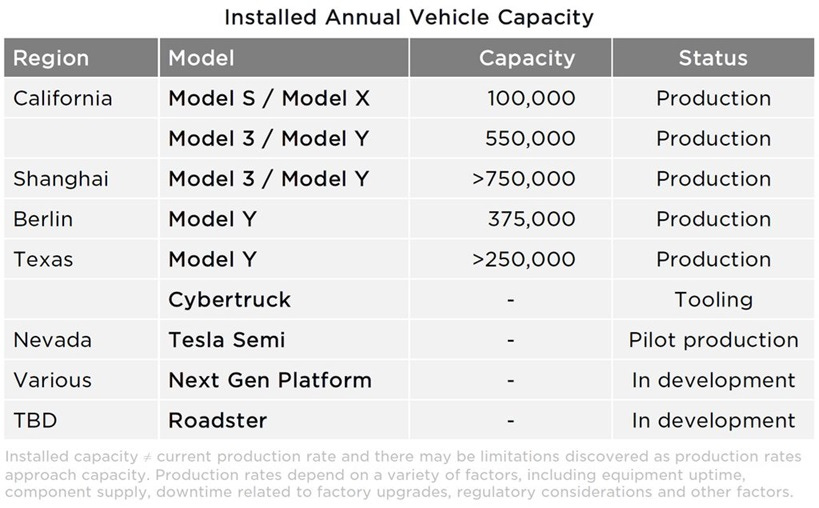
California is notoriously one of the most difficult states to build factories in, yet SpaceX manufactures most of its rockets in that state—these rockets are far superior to anything made in China—almost single-handedly reviving the aerospace industry in the Los Angeles area. And when Musk wanted to establish a data center for his new AI company xAI—a process that typically takes years—he reportedly completed it in just 19 days.
Contrary to Nate Silver's viewpoint, these achievements have little to do with Elon’s IQ.
Some progressives continue to mock Musk's intelligence, partly due to the traditional class resentment of the educated elite towards industrial giants. But I believe that more of the reason is simply what young people call "coping." Currently, Musk is applying all the talents he used to build companies—motivating employees, circumventing red tape, rapidly identifying and breaking through every bottleneck—to his efforts to reshape the American civil service through DOGE. Telling themselves that Musk has no talents, or that he is just lucky, or that he is just a charlatan, or that he succeeded only because of government help, are all ways progressives comfort themselves, believing that Musk's efforts are destined to fail.
Another way some people cope with Musk's "blitzkrieg" is to stubbornly insist that history is not driven by "great men," but by slow and unstoppable forces:

Of course, history is extremely complex and occurs only once, so historians cannot truly know how much of history is driven by "great men" and how much is driven by slow and unstoppable forces. When pressed, they will admit this:
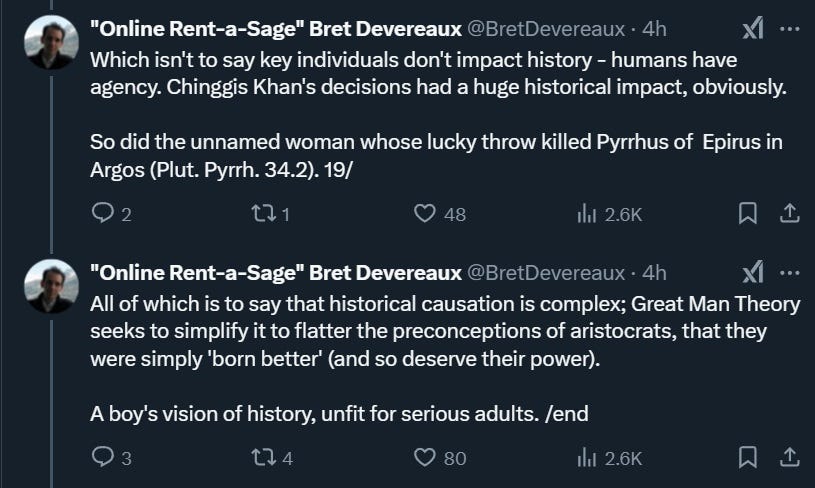
Note the key example of Genghis Khan. Of course, it is not just his decisions that influenced the course of history; many other steppe warlords also attempted to conquer the world but failed. Genghis Khan may have benefited from appearing at the right place at the right time, but he may have had the organizational and motivational talents that made him the only person in history capable of conquering so much territory.
Of course, Musk himself has not ignored this comparison:
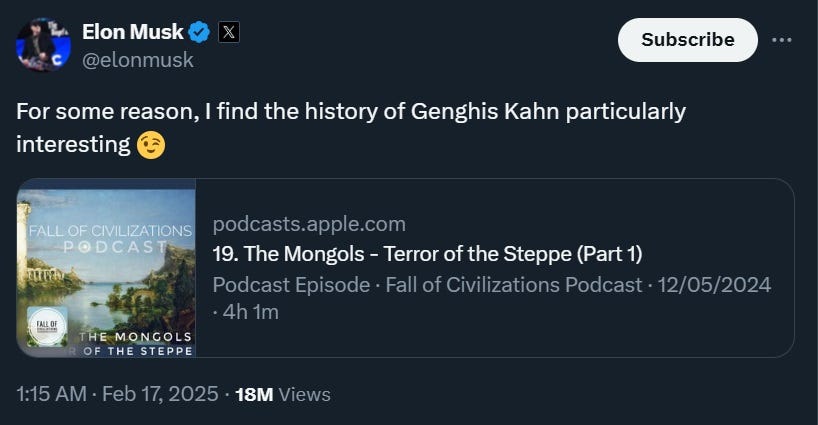
Before you can't help but laugh at Musk misspelling "Khan," remember that Genghis Khan himself could not spell his own name because he never learned to read and write—this vividly reminds us that book knowledge and organizational talent are two very different things. Those who comfort themselves by saying Musk will never conquer their country because he does not have the highest IQ in the world are as foolish as 13th-century scholars telling themselves that their country will never be conquered by an illiterate riding a pony.
However, beyond these "coping mechanisms" and class biases, I believe there is another reason some progressives try to label Musk as a "fool." Over the past 15 years, mainstream social media has replaced external reality in many people's lives to the extent that what happens on Twitter/X feels more real than what happens on the streets. In this virtual world filled with condemnation and insults, the only way to attack and defeat someone is to constantly call them "stupid" and get many others to simultaneously call them "stupid." The idea is that if enough people call someone "stupid" at the same time, then they are defeated, and you win. This is why everyone on Twitter/X is always calling someone an idiot, a fool, or other similar terms.
However, in the real world outside that little X app on your phone, simply calling someone "stupid" does not actually defeat them, just as Rachel Maddow's disparaging remarks about Trump on MSNBC do not actually "destroy Trump." Perhaps saying Musk has an IQ of only 110 makes you feel like you've defeated him in your little fantasy world, but in the real world, he is still dismantling your national institutions at an astonishing pace.
Those who think belittling Musk's abilities will somehow defeat him or make him disappear are simply fools—not low IQ, but rather unwise individuals who respond suboptimally to external challenges. In many important ways, Elon Musk is one of the most capable people in America, and denying this fact will only backfire on us.
免责声明:本文章仅代表作者个人观点,不代表本平台的立场和观点。本文章仅供信息分享,不构成对任何人的任何投资建议。用户与作者之间的任何争议,与本平台无关。如网页中刊载的文章或图片涉及侵权,请提供相关的权利证明和身份证明发送邮件到support@aicoin.com,本平台相关工作人员将会进行核查。



